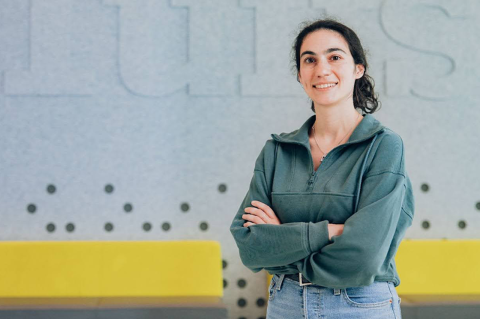
Student Experience
Online Learning at Tufts
Online graduate students at Tufts experience the same rigorous academics, expert faculty, and collaborative learning environment as their on-campus peers. The only difference is location. Through a student-centered approach, you’ll join a diverse community of engineers, scientists, and technical professionals who are driven to make meaningful contributions in their fields. You’ll also have access to dedicated faculty advising, career services, and a global alumni network that extends the value of your education well beyond graduation.
Whether you’re engaging in live virtual sessions, working on self-paced assignments, or collaborating with classmates across disciplines, Tufts online programs are designed to provide a flexible, supportive, and academically rich experience.
What are the online program benefits?
- Same Program, Same Faculty: Online students learn from the same distinguished faculty who teach on campus. These are leaders in research and industry who bring real-world insight and personalized mentorship to each course.
- Flexible and Interactive Learning: Courses combine self-paced assignments with live virtual sessions. Students use Canvas to access lectures, assignments, discussions, and grades in a single, user-friendly platform.
- Capstone Project with Real-World Impact: All master’s students complete a two-semester capstone project. This experience allows you to design, build, and present a solution to a real-world challenge that strengthens your skills and professional portfolio.
- Dedicated Faculty Support: You’ll receive academic guidance from a dedicated faculty advisor who supports your goals from enrollment through graduation.
- Career Services and Industry Connections: Access virtual career counseling, resume and interview preparation, and benefit from Tufts’ strong ties to Boston-area startups, research labs, and global tech organizations.
- Lifelong Alumni Network: After graduation, you become part of the Tufts alumni community of more than 125,000 professionals worldwide, offering long-term career value through connections, events, and peer support.

Live Classroom Instruction
School of Engineering online students have the opportunity to become fully immersed in the Tufts community through interactive experiences while benefiting from the flexibility of online learning. Students connect and collaborate with their peers and faculty in real time during virtual classes that are hosted by a web camera.
Class sizes are purposely kept small to encourage active engagement and purposeful discourse. Online faculty office hours are also available in this real-time format.
Asynchronous Coursework
Outside of real-time, virtual classroom experiences, online students also complete self-paced coursework—or asynchronous learning modules—each week in preparation for live classes.
The learning modules are led by Tufts distinguished faculty members and feature course topics that are brought to life through engaging multimedia content and instruction. Students can access the learning modules any time through the Canvas Learning Management System—and review them as often as they’d like.

Inside the Tufts Online Student Experience


Build your skills and your professional network with a Tufts online MSCS

Derik Hendriksen’s tech career pivot via the Tufts PBCSC
Whether you’re showcasing technical leadership, exploring a new domain, or building a portfolio-ready solution, the capstone project is your opportunity to turn knowledge into impact. Lead a project that demonstrates your skills, strengthens your resume, and sets you apart in the job market.
Explore projects completed by recent graduates:
-
Lanie Kropp wanted to use transfer learning to classify medical images for disease diagnosis. Her research focused on the trade-offs between dataset size and similarity, contributing to her deepening expertise in neural networks and research methodologies.
- Objective: Compare the effectiveness of transfer learning using large generic datasets, such as ImageNet, versus smaller, domain-specific datasets, like x-rays, for medical imaging tasks.
- Findings: Lanie discovered that larger, more generic datasets like ImageNet outperformed smaller ones, providing insights into the balance between data quantity and relevance.
- Reflection: “I gained a lot from this experience, especially in understanding transfer learning and neural networks. I’ve delved deeper into these topics than anything else in my master’s program, thanks to the extensive time and research I’ve dedicated to them.”
- Objective: Compare the effectiveness of transfer learning using large generic datasets, such as ImageNet, versus smaller, domain-specific datasets, like x-rays, for medical imaging tasks.
-
Sarah McDougall focused her project on leveraging machine learning to better identify risk factors for pregnancy-related complications. Through her work, she developed skills in handling large datasets and creating multi-label classifiers while navigating challenges such as mapping medical code systems and the complexities of data preprocessing.
- Objective: Use machine learning to identify risk factors for complications, like preterm delivery and hemorrhaging, based on clinical and social data.
- Findings: Sarah discovered that the models she developed tended to produce more false positives than false negatives. This suggests that patients should be vigilant about various risk factors and outcomes and not overlook any serious issues that could impact their health.
- Reflection: “Another value of the capstone is its potential to make a real-world impact. Depending on how far you progress in the project, you could submit your findings for publication or network with others in the same research area. The journey doesn’t have to end after the second semester.”
- Objective: Use machine learning to identify risk factors for complications, like preterm delivery and hemorrhaging, based on clinical and social data.
-
Steve Hong created Food Tusker, an innovative smart food management system designed to minimize household food waste through smart Tupperware that tracks expiration dates. With his project that combines hardware and software development, Steve plans to launch a Kickstarter campaign to bring this eco-friendly solution to market.
- Objective: Develop a hardware-software solution to reduce household food waste using smart Tupperware with expiration tracking.
- Findings: Steve developed a working prototype that includes hardware integration, a custom display, and a Flutter-based app for cross-platform compatibility. Steve plans to develop the project further and launch a Kickstarter campaign.
- Reflection: “It’s been a really interesting journey. The complexity taught me how to scope projects effectively and focus on incremental progress. It’s been fascinating—and I get excited to get up and work on it.”
- Objective: Develop a hardware-software solution to reduce household food waste using smart Tupperware with expiration tracking.
Quick Links
Flexible Online Programs
Advance your career with a 100% online master’s degree or certificate credential from Tufts School of Engineering.
Streamlined Application Process
Are you ready to apply to one of our online programs? Find out exactly what you need to begin the application process.
Funding Your Education
From scholarships to employer benefits and flexible payment plans, we help you focus on your studies and advance your career.
Admissions Events
Learn more about the Tufts community by attending a live information session or by watching an on-demand webinar.